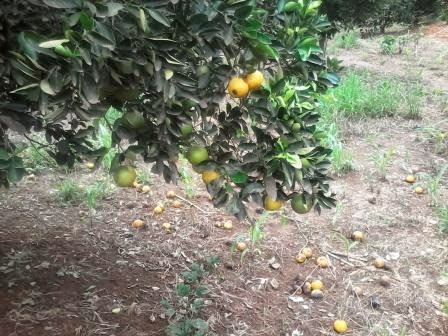Citrus
farming has the potential to become a major source of income contributor to the
Ghanaian economy as the country explores alternatives to over-reliance on cocoa.
Compared
to other African economies, Ghana has competitive advantage in citrus exports
to Europe.
But
Ghanaian citrus farmers are in dilemma as they are gradually losing their
livelihood to pests and diseases.
Seventy-two
year old Afia Achiaa went into citrus production 20 years ago. Like many others
at Mankranso in the Ahafo Ano South District of the Ashanti Region, the venture
is a main source of income.
But
Afia and her family’s plantation is severely devastated by high fruit drop due
to disease attack.
“I
enjoyed the high orange yield in times past but now I’m in dire financial
difficulty because of the premature ripe and drops of the fruits,” she
complained.
The
Citrus Angular Leaf Spot disease is said to be spreading at an alarming rate in
Ghana – crop yield loss is at a 50 percent minimum.
This
is a constraint to citrus production as posited by Ofori Amanfo Dacosta,
Chairman of the Citrus Producers Association.
“We
are finding it difficult to pay for our children’s school fees and controlling
the farm is a big challenge; we spend a lot of money to spray the farm but at
the end of it we don’t get anything to pay for the cost of maintenance,” he
said.
The
air-borne disease started spreading from the Central Region about seven years
ago, and it is taking over farms like bushfire in other regions.
Livelihoods,
employment opportunities and potential foreign exchange earnings are eluding
individual farmers, communities and the nation.
“Most
Scandinavian countries want to buy our citrus because the quality is good but
because some of these pests and diseases are not quarantined, we cannot
export,” observed Dr. Francis Collison Brentu at the University of Ghana’s
Forest and Horticulture Crops Research Centre.
The
citrus sub-sector of Ghana’s agricultural industry has the potential to create
an estimated one million jobs in Ghana.
Seth
Ayihi’s Pinora Limited, which processes fruit juice for export, is currently
producing about 40 percent below capacity due to challenges in accessing raw
materials.
Pests,
diseases and climate change remain a bane to the citrus value chain, he said,
raising fears of potential job losses at the processing end of citrus
production.
Seth
says intervention for farmers must be immediate and national in order to
achieve the desired results.
“Ideally
we need a national concerted effort from all stakeholders, backed by policy
from the government to tackle some of these diseases so that we can have
foreign exchange from the citrus in addition to cocoa,” stated Dr. Brentu.
The
Platform for African-European Partnership on Agricultural Research for
Development (PAEPARD) is seeking innovative ways to control the angular leaf
spot of citrus disease.
Prof.
Wale Adekunle of the Forum for Agricultural Research in Africa (FARA) says the
challenge can be addressed within a season if interest groups come together
under a national platform.
“What
FARA has worked on in the last 12years is to develop an approach to solve this kind
of problem and we call it ‘the Development of Integrated Agricultural Research
for Development’ in which place all the stakeholders work together to determine
the research and development agenda,” he said.
Ghana’s
parliament has an oversight responsibility for various state ministries.
Francis
Kojo Ackah, a ranking member of the Food, Agriculture and Cocoa Affairs
Committee of Parliament, says access to information is critical.
“We
are now getting to know that this disease if not controlled can destroy the
whole citrus production in this country; so seriously we are going to address this
issue so that we curb the menace as quickly as possible,” he assured.
Citrus
Producers’ Chairman, Mr. Amanfo Dacosta, is calling for mass spraying of citrus
farms as part of a holistic solution to the challenge.
Other
challenges to address include low soil fertility, lack of disease-free planting
material, poor harvesting and post-harvest handling as well as lack of market
access.
Story
by Kofi Adu Domfeh
Listen to Audio Report...



.JPG)





























